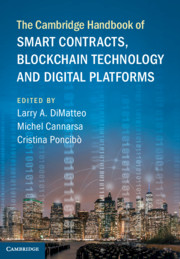Book contents
- The Cambridge Handbook of Smart Contracts, Blockchain Technology and Digital Platforms
- The Cambridge Handbook of Smart Contracts, Blockchain Technology and Digital Platforms
- Copyright page
- Dedication
- Summary of Contents
- Contents
- Contributors
- Preface
- Part I General Framework
- Part II Contract Law and Smart Contracts
- Part III Electronic Platforms and Networks
- Part IV Privacy, Security and Data Protection
- Part V Smart Contracts
- Part VI Future of Smart Contracts, Blockchain and Artificial Intelligence
- 17 Smart Transactional Technologies, Legal Disruption, and the Case of Network Contracts
- 18 Observations on the Impact of Technology on Contract Law
- 19 Visions of Future
18 - Observations on the Impact of Technology on Contract Law
from Part VI - Future of Smart Contracts, Blockchain and Artificial Intelligence
Published online by Cambridge University Press: 25 October 2019
- The Cambridge Handbook of Smart Contracts, Blockchain Technology and Digital Platforms
- The Cambridge Handbook of Smart Contracts, Blockchain Technology and Digital Platforms
- Copyright page
- Dedication
- Summary of Contents
- Contents
- Contributors
- Preface
- Part I General Framework
- Part II Contract Law and Smart Contracts
- Part III Electronic Platforms and Networks
- Part IV Privacy, Security and Data Protection
- Part V Smart Contracts
- Part VI Future of Smart Contracts, Blockchain and Artificial Intelligence
- 17 Smart Transactional Technologies, Legal Disruption, and the Case of Network Contracts
- 18 Observations on the Impact of Technology on Contract Law
- 19 Visions of Future
Summary
The public debate about smart contracts, meant as self-help remedies grounded on distributed ledger technology, is filled with alarms and high expectations. They have been praised by the tech community as infallible software able to carry out the whole contractual cycle, from formation to enforcement. Conversely, several legal scholars have raised concerns regarding both smart contracts’ inability to reflect relational aspects of contract governance and the augmented complexity generated by the translation of an agreement into computer code. The chapter focuses the discussion on the potential areas which could effectively benefit from implementation of smart contracts. Firstly, it argues that smart contracts might be a viable tool to tackle effectively consumers’ inertia in triggering and enforcing their rights which are standardized and easily verifiable. Secondly, smart contracts have the potential to foster commercial relationships by lowering down transaction costs arising from lack of trust between merchants. Thus, smart contracts are likely to provide better alternatives to traditional tools of business practice, such as letters of credit and escrow agreements.
- Type
- Chapter
- Information
- The Cambridge Handbook of Smart Contracts, Blockchain Technology and Digital Platforms , pp. 334 - 358Publisher: Cambridge University PressPrint publication year: 2019

